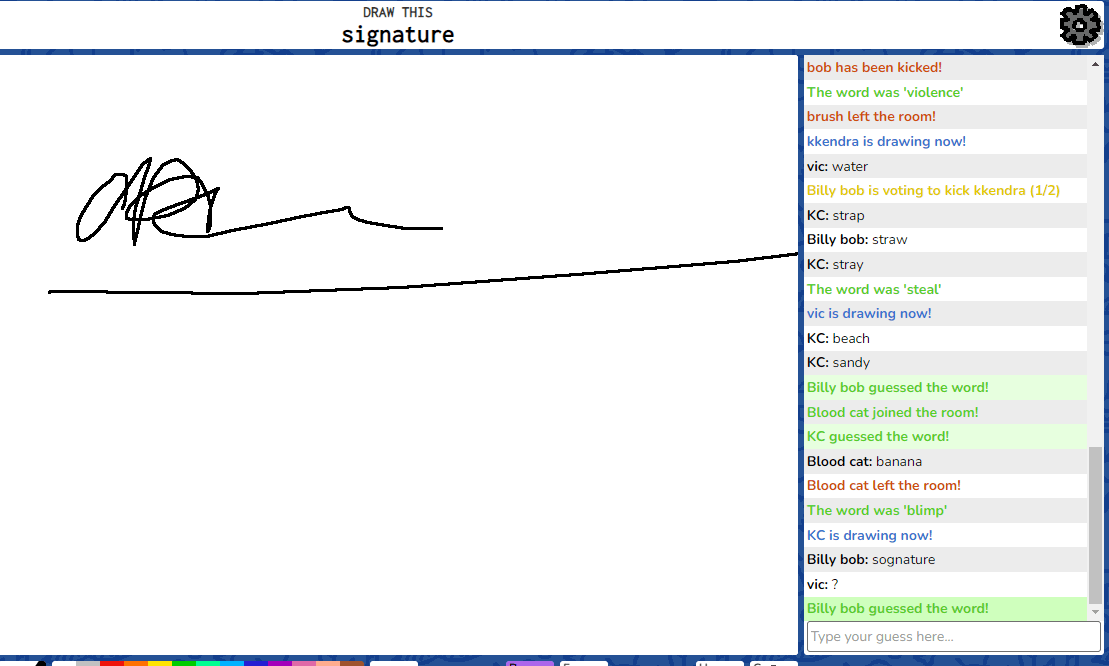
Name of the Game: Skribbl.io
Target Audience: Gamers of all ages with a focus on those enjoying casual and social gaming experiences.
Game’s Creator: Ticedev
Platform of the Game: Web browsers.
Introduction to Skribbl.io
“Skribbl.io” is an online multiplayer game that combines judgment, guesswork, and drawing into a fast-paced, dynamic environment. Players of all ages are welcome to participate in a digital rendition of the beloved drawing game, which is available on multiple web platforms. The judging process involves the players taking turns drawing a word that has been allocated to them and others guessing the word as fast as they can. Notably, players are aware of how long the word is, and as time progresses, more letters are revealed, assisting in the guessing process. Points are given for guesses that are made correctly and quickly. This game is a great option for casual players and those who want to use gaming as a way to connect with others because of its accessibility and simplicity.
Central Argument
Players’ ability to understand and depict words through drawings is intrinsically linked to their judging in “Skribbl.io”. Artists get to choose the word they draw from a selection of three, adding a layer of strategy in their decision-making. This system works to create a competitive yet cooperative atmosphere, which not only affects the game’s tempo and excitement but also has a big impact on group dynamics. Maintaining interest and a competitive atmosphere, players take on the roles of both artists and judges by giving their all during gameplay. Due to their mutual reliance on each other’s clear drawings for accurate predictions, participants are encouraged to strike a balance between competition and teamwork, which fosters cooperation and camaraderie.
Additionally, the inclusive judging method democratizes the gaming experience, as each player’s guesses and drawings influence the result. As a result of this shared responsibility, players’ social bonds are strengthened as they go through highs and lows together. Consequently, “Skribbl.io” has a greater impact on group interactions by subtly enhancing visual communication and rapid thinking abilities in addition to providing entertainment.
Comparison with Other Games and Analysis of Group Dynamics and Relationships
In “Skribbl.io,” participants take turns acting as judges, evaluating each other’s drawings based on fast guesses. Unlike other judgment games like “Cards Against Humanity” or “Apples to Apples,” where a single player frequently controls the judging for extended periods of time, this shared obligation democratizes the gaming. In “Skribbl.io,” each player has an equal chance to affect how the game turns out, guaranteeing fair play and active engagement.
Furthermore, instead of using a subjective scoring system based on the judge’s humor or personal preferences, like in traditional judging games, “Skribbl.io” uses an objective method where points are automatically awarded for the right answer. This design choice minimizes conflicts and enhances fairness in gameplay, though it may reduce the humorous unpredictability seen in more subjective judging games.
It is a test of each player’s ability to communicate visually in a limited amount of time when it is their turn to draw, and guessers have to swiftly decipher these designs. The scoring system supports this balance by rewarding both the artist and the guessers—points go to the drawer for clear depictions and to guessers based on the speed and accuracy of their responses. This creates a balanced yet competitive environment by rewarding both accurate sketching and careful guessing.
By encouraging inclusivity and ongoing participation, this rotating judge system improves group dynamics. Every round keeps players engaged and invested since they are using their critical thinking skills when guessing and their communication skills while sketching, which makes for a more social and participatory gaming experience.
Integration of Course Concepts (MDA Framework)
Applying the MDA framework we learned from class, we can recognize what makes the game appealing.
- Mechanics: Drawing and guessing are the game mechanics; guesses that are made fast and accurately get points, thus players are encouraged to guess and draw swiftly and clearly.
- Dynamics: Players respond to each other’s drawings in real time, creating a dynamic environment that is fostered by these mechanics. Trying to predict before others can be a competitive element that can generate a dynamic atmosphere that promotes social interaction.
- Aesthetics: “Skribbl.io” offers fellowship and discovery as players often laugh over misinterpretations of drawings and celebrate how challenging words are cleverly drawn.
Evidence and Gameplay Experience

During gameplay sessions, it was clear that players who could quickly adapt their drawing style to communicate effectively with their peers tended to score higher. For example, in one game, I had to draw a signature. Initially, I just scribbled letters which was unsuccessful in getting people to guess the word correctly. However, by drawing a line below the scribbles, it immediately conveyed to others that it was some form of writing, and thus, could be deduced as a signature. This quick adaptation highlighted how minimalistic yet strategic visual cues could efficiently communicate complex concepts in the game.
Suggestions for Improvement
I think a wider range of players could find the game more engaging and interesting if more diverse word lists and maybe even categories were included. Furthermore, adding a function that rewards imaginative drawings in addition to the first accurate guess could add depth. This would encourage artistic innovation in the word depiction.
Conclusion
“Skribbl.io” serves as an example of how judging in games can be set up to favorably impact group dynamics and encourage a healthy balance between friendly competition and shared enjoyment. The game keeps a vibrant and welcoming environment, which is essential for social games, by having each player alternate in the role of judge. I believe these potential changes could further improve the game’s harmony of enjoyment, equity, and artistic expression as it develops.



